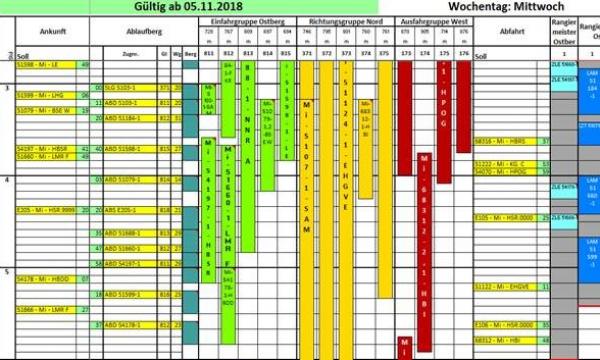
You are here
Chair of Rail and Public Urban Transport and the Transport II Logistics Working Group
Control algorithms developed at TU Dresden together with DB Cargo AG optimise processes in marshalling yards / New approaches to the digitalisation of a strong and future-proof rail freight transport.
"More goods on rail!" is a current demand when it comes to climate and resource protection in connection with the transport and traffic turnaround. However, transporting goods by truck is still more attractive for many companies because the goods can be transported from A to B faster and more directly. If the railway wants to become a real alternative and break up the dominance of truck transport, (handling) processes must be optimised, among other things, in order to save time and costs. One approach to this is to digitalise and optimise the handling processes in the large marshalling yards - technical term: train formation yards (ZBA).
A research project that pays attention to increasing the attractiveness of rail freight transport and shifting the modal split (= share of a transport mode in the overall transport market) towards rail is "APP ZBA" (Automatic Process Planning in Train Formation yards) at the TU Dresden (TUD), "Friedrich List" Faculty of Transport and Traffic Sciences. Together with DB Cargo AG, novel control algorithms for process flows were developed and implemented in a decision support software. The potential here can be seen at various levels: Planning processes are faster and independent of expert knowledge, the efficiency of train formation processes increases and reliable statements on capacity increases in the facilities are possible.
Practical introduction of the application at DB Cargo AG – Optimisation of 19 large ZBAs
The application is currently being put into practice at DB Cargo AG. The processes of the 19 largest train formation yards in Germany are being optimised with the APP ZBA planning software. Martin Haug, DB Cargo AG, Head of Strategic Planning & Steering, says: "APP ZBA enables us to plan the processes of our marshalling yards much better and faster and also to react to changes at short notice. It is an important contribution to the digitalisation strategy for strong and future-proof rail freight transport."

Output of the result of the optimisation calculation in MS EXCEL format, easily comprehensible for system planners and employees.
APP ZBA has been developed in several stages at the Center for Rail Logistics since 2014. This is a cooperation between the Chair of Rail and Public Urban Transport and the Transport Logistics Working Group* at the "Friedrich List" Faculty of Transport and Traffic Sciences of the TUD, later continued by the company NEOMOBIL (a spin-off of the Chair of Rail and Public Urban Transport). The project team is made up of experts with extensive domain knowledge of rail freight transport (Dipl.-Ing. Oliver Freitag, Dr.-Ing. Jan Eisold and others from the Chair of Rail and Public Urban Transport) and specialists in modelling and optimisation from the Transport Logistics working group (Dr.-Ing. Henning Preis and Dr.-Ing. Stefan Frank).
Further development planned in the direction of online control of marshalling yards
The introduction of the APP ZBA planning software into practical operation at DB Cargo AG is just the beginning. Research and development projects based on this are already underway. The extension of APP ZBA to the local areas of the train formation facilities and the online control of the facilities are in the foreground. The transport logistics working group is dedicated to the further development of optimisation procedures, which can then also be used across disciplines for resource management.

Result of the optimisation calculation of the resource allocation in the APP ZBA programme on the left as a table of job allocations for locomotive shunting drivers, on the right as a Gantt chart (bar chart).
The Transport Logistics Working Group at TU Dresden
The Transport Logistics Working Group at the "Friedrich List" Faculty of Transport and Traffic Sciences at TU Dresden conducts cutting-edge research on exciting and forward-looking topics in transport logistics. It is particularly dedicated to the problems of interconnecting modes of transport in multimodal freight transport, process optimisation at the interfaces and the optimal use of resources in logistics networks.
The basis for this is formed by mathematical methods of optimisation and models of decision support for transport logistics problems.
Teaching is geared towards basic knowledge of logistical interrelationships, methodical problem-solving competence and current findings in transport logistics research.
Contact at TU Dresden
Dr.-Ing. Henning Preis
Head of the Transport Logistics Working Group
"Friedrich List" Faculty of Transport and Traffic Sciences, TU Dresden
mail: henning.preis@tu-dresden.de
APP ZBA ... is an important contribution to the digitalisation strategy for strong and future-proof rail freight transport.
